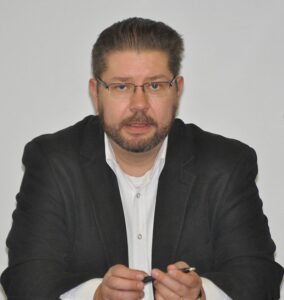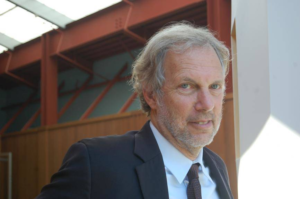NATO Membership May Spell The End Of Finland And Sweden As Social Democracies
Russia’s invasion of Ukraine was a godsend for the North Atlantic Treaty Organization (NATO), which had been declared “brain dead” by French President Emmanuel Macron as recently as 2019. Now, NATO has not only gained a new lease on life but also is expected to grow, with Finland and Sweden inching closer to NATO membership.
In fact, Putin’s criminal attack on Ukraine has managed to keep Europe within the sphere of U.S. hegemony and thus to halt any aspirations that Europeans may have had of seeing the continent shift toward greater autonomy.
In the interview that follows, Finnish political scientist Heikki Patomäki provides a critical look into the reasons why Finland and Sweden have opted to join NATO and the potential consequences for Nordic social democracy. Patomäki’s views have been demonized for simply going against the frenzied dictates enforced by Western governments and the corporate media regarding proper responses to the ongoing war in Ukraine. Patomäki is professor of global politics and research director of the Helsinki Collegium for Advanced Studies at the University of Helsinki. He is a member of the Finnish Academy of Sciences and Letters and author of scores of books and academic articles.
C.J. Polychroniou: Heikki, Russia’s invasion of Ukraine has reinvigorated NATO. Indeed, a new era seems to be underway as Finland and Sweden have decided to end decades of neutrality and join the transatlantic alliance. Let’s talk about Finland, which has a long and unique relationship with Russia on account of its history. Why does Finland want to join NATO? Is there really a security concern? What are the domestic debates surrounding its membership in NATO?
Heikki Patomäki: A simple but very incomplete answer is that the actions of Putin’s regime have caused Finland to join NATO. The first peak of support for NATO membership was in 2014-2015, but especially the impact of the 2022 invasion has been dramatic. While a significant part of the political elite has favored Finnish NATO membership for years either publicly or privately, for the bulk of the population the main motivation is now primarily fear. Most lay proponents of NATO seem to think membership will deter Russia from attacking Finland, which of course presupposes that such an attack is an imminent possibility. In their eyes, the North Atlantic alliance is like a big father with big guns who comes to protect us if needed. I think that is a rather primitive argument, even if somewhat understandable under the circumstances.
Finns — like many Europeans — seem to be relating themselves to this war in a very different way than to say the war in Syria or Yemen, or the wars in Iraq (2003-2011, 2013-2017). An aspect of this is clearly related to Eurocentrism: Ukraine is in Europe, and this war is close to us. The distance from Helsinki to Kyiv is about the same as that to the northernmost part of Finland. The invasion of Ukraine evokes historical memories of the Winter War (1939-40) and Russia as the eternal enemy. This evocation constitutes a regressive historical moment involving turning to stories that were prevalent in the 1920s and 1930s when the right was defining Finland as the outermost post of Western civilization against the “barbarism” of Russian Bolshevism. The current understanding is in sharp contrast to the developments after the Second World War when a new cooperative understanding of Finland’s eastern neighbor evolved, despite very different social systems. What I hear now is Western Cold War mentality: The Russians are not only inherently bad but there may be no way we can ever cooperate with them again.
At a deeper level, the impact of the Russian invasion cannot be disentangled from longer-term processes of political change. Responses to the invasion in Ukraine stem in important part from gradual changes in the taken-for-granted background of social understandings, media representations and political rhetoric, which have prepared the ground for what can be seen as a further shift to the right cutting across all political parties. In the 1990s, the identity of Finland was redefined as a Western country, and as a member of the EU, to replace the earlier idea of a neutral social-democratic Nordic country, though the two coexisted for some time. Neoliberalization in turn has gradually changed meanings, mentalities, practices and institutions in Finland, paving the way to the rise of nationalist-authoritarian populism in the 2010s that followed the global financial crisis of 2008-2009 and its aftermath, including the Euro crisis. Some details may be peculiar to Finland, but otherwise, these processes are common across the interconnected world.
Since 1994, Finland and Sweden have participated in NATO’s Partnership for Peace plan. Particularly the Finnish armed forces have been matched with the NATO systems, culminating in a recent decision to buy 64 nuclear-weapons compatible F-35 fighters from the U.S. In the 2000s and 2010s, both countries participated in NATO’s “peace-support” operations and concluded NATO host nation support agreements. Hence, the invasion and the consequent turn in public opinion have merely enabled and triggered the ultimate step in the long process of integration with NATO, namely formal membership. Read more
Organizers Are Demanding A Green New Deal For The Gulf South

Jesse George – New Orleans Policy Director for the Alliance for Affordable Energy. Photo: https://www.all4energy.org
The Gulf Coast is home to “over 47% of total petroleum refining capacity … as well as 51% of total U.S. natural gas processing plant capacity,” according to the U.S. Energy Information Administration. Given that the burning of fossil fuels is the primary cause of the climate crisis, the Gulf Coast is a primary site driving global warming — and revealing its impacts. Extreme weather has become quite common in the entire region and sea levels are expected to rise between 14 and 18 inches by 2050, according to the National Oceanic and Atmospheric Administration.
In this context, the Green New Deal project proposed by progressive activists and lawmakers carries special weight for sustainability in the Gulf Coast. Much of the Gulf South region of the United States — Texas, Louisiana, Mississippi, Alabama and Florida — is politically conservative, which means the fight against the fossil-fuel economy is a truly uphill battle. Nonetheless, activism for transformative change is quite widespread throughout the Gulf Coast region. There are hundreds of organizations in the region committed to the fight against the climate crisis, even though they may not be nationally known and surely do not get the attention they deserve from corporate-owned media.
The Gulf South for a Green New Deal (GS4GND) is a regional formation of some 300 organizations working towards climate, racial, and economic justice across the Gulf South. It was launched in May 2019, with hundreds of attendees representing tribal nations, neighborhood associations, student groups and community organizations. A few months later, GS4GND produced a policy platform outlining what a Green New Deal should entail in order to be successful in the Gulf South.
On June 4, people from across the Gulf Coast will gather in Baton Rouge, Louisiana, for the Gulf Gathering for Climate Justice and Joy. Ahead of this event, Truthout interviewed Jesse George, the New Orleans Policy Director for the Alliance for Affordable Energy. In the interview below, George discusses the importance of organizing and the need for a just transition in the Gulf Coast. He also explains the obstacles facing organizers in their fight against the powerful corporate interests entrenched in the Gulf South. This fight draws inspiration from the “rich legacy of liberation” in the region, George noted.
C. J. Polychroniou: What would a just transition look like in the Gulf South?
Jesse George: For generations the fossil fuel industry has degraded our land, air, and water across the Gulf South. As we face stronger and more frequent storms, ever accelerating land loss, and the compounding effects of climate change, it is critical that we transition from a fossil fuel-based economy to a renewable energy future that prioritizes the needs of Gulf South residents, especially the Black and Indigenous communities who have paid most dearly in this extractive economy.
Across the region, corporate interests have told Gulf South residents that they have but two choices — surrender their resources to industry in exchange for promised (but never realized) prosperity or risk complete economic destruction. And now, as we seek to protect our homes and communities from the worsening impacts of climate change, polluters are ready with another set of lies that could cost us our lives — dangerous and unproven technologies backed by false promises like carbon capture and biomass. The truth is that polluting industries have offered little in the way of economic security and their latest scheme to continue extracting the region’s resources will do nothing but line the pockets of the very executives responsible for polluting our land, air and waterways.
But a just transition — one that uplifts the workers and fenceline communities that have shouldered the burdens of the petrochemical industry — is possible and presents tremendous opportunities here in Louisiana and the entire Gulf South. For example, Louisiana has long been known as an energy state, and that doesn’t have to change. We just have to change the ways we make that energy. Across the Gulf South there is tremendous potential for offshore wind, and yet we’ve seen practically no development. The infrastructure and workforce that currently services offshore oil rigs could easily be transitioned to installing and maintaining offshore wind turbines. A just transition means paying for job training so that those workers can make the transition to the renewable energy future. We have a duty to ensure the economic benefits of the new renewable energy economy don’t just flow upwards but benefit the people who have suffered most severely from the impacts of the extractive economy.
And finally, a just transition means building climate resistant communities. Last year Hurricane Ida, one of the strongest hurricanes in recorded history, ripped through south Louisiana before making its way northward retaining enough strength to flood New York City subways. Our energy grid failed and folks were left for weeks, even months, without power in extreme heat. People died. Renewable energy, particularly local solar where folks are equipped with panels and batteries that feed into microgrids, could save lives in an event like this. We have the technology. We just need to build the political power to transform our economy. Read more
Chomsky: We Must Insist That Nuclear Warfare Is An Unthinkable Policy
The war in Ukraine is now in its fourth month, but there is no sign of a ceasefire or resolution anywhere in sight. Ukrainian President Volodymyr Zelenskyy has ruled out a ceasefire or concessions, yet he maintains that only diplomacy can end the war. In the meantime, Russian forces are trying to capture eastern Ukraine, while the policy of the United States is to provide military support to Zelenskyy’s government for as long as it might take to weaken Russia in hope that regime change will come to Moscow.
These developments do not bode well either for Ukraine or for the world at large, argues Noam Chomsky, a public intellectual regarded by millions of people as a national and international treasure. In this new and exclusive interview for Truthout, Chomsky urges the forces capable of ending the war to devote their energy to finding constructive ways to put a halt to the unfolding tragedies. In addition, he analyzes the new and highly dangerous global order that is taking shape. Perhaps to the surprise of many, especially considering the ongoing war in Ukraine, he does not describe the U.S.-Russia confrontation as the central element of the new global order in the making. Chomsky is institute professor and professor of linguistics at MIT and currently laureate professor at the University of Arizona, and has published some 150 books in linguistics, political and social thought, political economy, media studies, U.S. foreign policy and international affairs.
C.J. Polychroniou: After months of fighting, there is still very little hope of peace in Ukraine. Russia is now refocusing its efforts on taking control of the east and south of the country with the likely intent of incorporating them into the Russian Federation, while the West has signaled that it will step up military support for Ukraine. In the light of these developments, Ukrainian officials have ruled out a ceasefire or concessions to Moscow, although President Volodymyr Zelenskyy also went on record saying that only diplomacy can end the war. Don’t these two positions cancel each other out? Doesn’t a mutually acceptable agreement for a war to end always contain concessions? Indeed, back in March, the Ukrainian government had signaled its intention that it was willing to make big concessions for the war to end. So, what’s going on? Could it be that neither side is fully invested in peace?
Noam Chomsky: I’ll come back to the questions, but we should carefully consider the stakes. They are very high. They go far beyond Ukraine, desperate and tragic as the situation is there. Anyone with a moral bone in their body will want to think through the issues carefully, without heroic posturing.
Let’s consider what is at stake.
First, of course, is Putin’s invasion of Ukraine, a crime (to repeat once again) that can be compared to the U.S. invasion of Iraq or the Hitler-Stalin invasion of Poland, the kind of crimes against peace for which Nazi war criminals were hanged — though only the defeated are subject to punishment in what we call “civilization.” In Ukraine itself, there will be a terrible toll as long as the war persists.
There are broader consequences, which are truly colossal. That’s no exaggeration.
One is that tens of millions of people in Asia, Africa and the Middle East are literally facing starvation as the war proceeds, cutting off desperately needed agricultural supplies from the Black Sea region, the primary supplier for many countries, including some already facing utter disaster, like Yemen. Will return to how that is being handled.
A second is the growing threat of terminal nuclear war. It is all too easy to construct plausible scenarios that lead to a rapid climb up the escalation ladder. To take one, right now the U.S. is sending advanced anti-ship missiles to Ukraine. The flagship of the Russian fleet has already been sunk. Suppose more of the fleet is attacked. How does Russia then react? And what follows?
To mention another scenario, so far Russia has refrained from attacking the supply lines used to ship heavy armaments to Ukraine. Suppose it does so, placing it in direct confrontation with NATO — meaning the U.S. We can leave the rest to the imagination.
Other proposals are circulating that would very likely lead to nuclear war — which means the end, for all of us, facts that do not seem to be properly understood. One is the widely voiced call for a no-fly zone, which means attacking anti-aircraft installations inside Russia. The extreme danger of such proposals is understood by some, notably the Pentagon, which so far has been able to veto the most dangerous proposals. For how long in the prevailing mood?
These are horrendous prospects. Prospects: what might happen. When we look at what actually is happening, it gets worse. The Ukraine invasion has reversed the much-too-limited efforts to address global warming — which will soon become global frying. Prior to the invasion, some steps were being taken to avert catastrophe. Now that has all been thrown into reverse. If that continues, we’re done.
One day the IPCC issues another severe warning that if we are to survive, we must start right now to reduce use of fossil fuels. Right now, no delay. The next day President Biden announces vast new expansion of fossil fuel production.
Biden’s call to increase fossil fuel production is sheer political theater. It has nothing to do with today’s fuel prices and inflation, as claimed. It will be years before the poisons reach the market — years that could be spent on moving the world rapidly to renewable energy. That’s perfectly feasible, but barely discussed in the mainstream. There’s no need to comment here. The topic has recently been expertly analyzed by economist Robert Pollin in another of his essential contributions to understanding this critical issue of survival and acting on that understanding.
It is crystal clear that settling the Ukraine crisis is of extraordinary significance, not just for Ukraine itself but because of the calamitous consequences beyond if the war persists.
What then can we do to facilitate ending the tragedy? Let’s begin with virtual truism. The war can end in one of two ways: Either there will be a diplomatic settlement, or one side will capitulate. The horror will go on unless it ends with a diplomatic settlement or capitulation.
That at least should be beyond discussion. Read more
Indigenous Organizers In Alaska Lead The Way Toward Livable Climate Future
In the United States, the public and politicians are moving in opposite directions on climate change. Grassroots environmental activism is spreading on the local state, regional and national levels, while Congress generally continues with a “business-as-usual” approach, rejecting the foremost way to avoid the worst consequences of global warming: the Green New Deal.
While the Green New Deal remains aspirational in the U.S., it has been adopted by the European Union, and scores of countries around the world have committed to pursuing its goals.
Among the many organizations in the U.S. fighting for environmental sustainability and a just transition toward clean, renewable energy is Native Movement, an organization dedicated to building people power for transformative change and imagining a world without fossil fuels.
“There is no future at all with continued oil and gas extraction,” says Ruth Łchav’aya K’isen Miller, Native Movement’s climate justice director, in this exclusive interview for Truthout. “We must eliminate fossil fuel extraction now through a just transition that guarantees justice for workers and for the lands.”
Miller is a Dena’ina Athabascan and Ashkenazi Jewish woman. She works toward Indigenous rights advocacy and is a member of the Alaska Just Transition Collective and the Alaska Climate Alliance.
C.J. Polychroniou: Ruth, what does a just transition, from a Native and Indigenous perspective, look like in Alaska?
Ruth Miller: A just transition is a journey of returning to economies, governance structures and social contracts that are not new, but built on Indigenous wisdoms and place-based knowledge to create a truly regenerative economy. A just transition will be built on a values framework of anti-racism and decolonization, deep reciprocity, and respect for all lands, waters and air.
Any just transition for Alaska must be rooted in Indigenous perspectives, because it is Alaska’s Native nations who have lived in harmony with these lands for over 30,000 years, and whose deep connections, encyclopedic knowledge and spiritual interconnectivity will heal the wounds of the past 100 years of colonization and extractive capitalism. For this reason, we refer to this shift in resource extraction, governance, labor practices and culture as “remembering forward,” first translated in 2020 in the Behnti Kengaga language as “Kohtr’elneyh,” and in 2022 in the Dena’ina language as “Nughelnik.”
In Alaska this takes many forms. It includes deep democracy, which actively seeks to incorporate minority voices as well as those in the majority and requires the diversification of elected leaders. It includes an end to all oil and gas extraction, as well as irresponsible mining and other development projects. It means a return to responsible land management practices, including timber and fisheries management, and it means returning stewardship of lands and waters back to their original and eternal caretakers. It includes supporting Alaska Native language and cultural revitalizations while supporting unimpeachable subsistence hunting and fishing rights. It means all workers will have their fair pay and rights protected through strong unions, while communities will be empowered to support themselves through mutual aid networks and non-predatory community loan funds for moving toward clean and efficient energy.
A just transition for Alaska means investing in regenerative industries like sustainable mariculture and ocean-healing crops such as kelp, while also supporting culturally informed eco-tourism that elevates local business with local returns. As we have previously written for Non-Profit Quarterly, “To achieve [a Just Transition], resources must be acquired through regenerative practices, labor must be organized through voluntary cooperation and decolonial mindsets, culture must be based on caring and sacred relationships, and governance must reflect deep democracy and relocalization.”
Why is the complete elimination of fossil fuel extraction needed to secure a just transition?
The simple truth is that the oil and gas industry is one of the largest contributors to climate change, spewing greenhouse gas emissions to the point at which we are now in the sixth great extinction — one which has been entirely caused by recent human activity. The Arctic, being bled dry for its non-renewable resources, is now experiencing a climate crisis at two to four times the rate as the rest of the globe.
In Alaska, thawing permafrost is not only destabilizing Arctic infrastructure, but the thawing of eons-old organic material leads to the accelerated release of methane, a gas more than 25 times as potent as carbon dioxide at trapping heat in the atmosphere. The same thawing is leading to coastal and riverbed erosion, causing more and more communities to be forced to relocate. Already less Arctic sea ice returns in the winter than past generations remember, putting coastal communities at increased risk of damage by winter storms.
With a global temperature rise of 2.5 degrees Celsius or higher (which we are projected to reach within the decade without drastic international action now), it is expected we will have an entirely ice-free Arctic Ocean at least once every eight years. Beyond their climate effects, extractive projects are already causing extreme and irreversible devastation to lands, waters and food systems.
The ecological harm caused by such projects leaves toxic waste, pollution and contamination, harming the health of Alaska Native peoples who live closest with the land. Near the sites of extractive projects, high rates of cancers, birth defects, respiratory illnesses, and more health impacts have been observed for decades. Indigenous women, girls and two-spirit relatives suffer increased rates of homicide, disappearance and domestic violence in and around the man camps that supply labor to extractive development projects.
There is no future at all with continued oil and gas extraction…. We must eliminate fossil fuel extraction now through a just transition that guarantees justice for workers and for the lands. Read more
Biden Is Breaking His Climate Promises. What Are The Consequences?
Although the war in Ukraine has put climate action on the back burner for many policy makers, the global climate crisis is spinning out of control. Various climate records were smashed in 2021, and greenhouse gas emissions are on course to hit record levels in 2023. In the face of such dramatic developments, political inaction on the climate front could portend an imminent environmental catastrophe.
In the interview that follows, world-renowned progressive economist Robert Pollin discusses the latest developments on the climate crisis, starting with Biden’s broken promises to provide leadership in the fight against the climate emergency, and the problems of soaring energy costs and inflation. He also refutes the arguments in favor of nuclear energy, as well as the claims that there is very little we can do to stop the burning of fossil fuels. Pollin is distinguished professor of economics and co-director of the Political Economy Research Institute (PERI) at the University of Massachusetts at Amherst, where he has authored many climate stabilization projects for different U.S. states. He is also the author of many books, including Climate Crisis and the Global Green New Deal: The Political Economy of Saving the Planet (co-authored with Noam Chomsky).
C.J. Polychroniou: Bob, why did Biden break his promise on no new leasing on federal lands? Aren’t there other ways to fight soaring energy costs besides a “drill, baby, drill” policy? And will record high gas prices actually be solved by drilling more?
Robert Pollin: The Biden administration announced last April 15 that it would lift the executive order it had established in January 2020 that imposed a temporary ban on auctioning off federal lands for oil and gas leasing. This is despite the fact that, as a presidential candidate, Biden pledged, “And by the way, no more drilling on federal lands, period. Period, period, period.” So much for even Biden’s most emphatic campaign promises.
One excuse that the administration has given for Biden’s flip-flop is that a federal judge in Louisiana had struck down the January 2020 executive order. However, Biden could have easily delayed the awarding of new drilling permits indefinitely by fighting the judge’s order in court. Biden chose not to do this. The administration’s excuse here is that, in the immediate, Biden has had to focus on pushing down energy prices and overall inflation. The administration claims that opening up federal lands for drilling will increase oil and gas supply and thereby counteract the sharp oil and gas price increases that have prevailed since over the past year.
Specifically, the average retail price of gasoline has risen nearly 150 percent over the past year, from an average of $1.77 per gallon over May 2021 to $4.23 from May 1–23 this year. This spike in gasoline prices, along with rise in heating oil prices, has, in turn, been the single biggest driver causing overall U.S. inflation to rise by 8.3 percent over the past year, the highest U.S. inflation rate in 40 years.
Without question, we face serious problems with surging oil and gas prices and overall U.S. inflation. But it is also obvious that expanding drilling on public lands will have precisely zero impact on oil prices over the next year or two, if at all. This is because any supplies that could be produced through new drilling on federal lands will not become available in the retail energy market for at least 1 to 2 years. In addition, the amount of new oil and gas supplies that could ever come onstream from these projects would be minuscule as a share of the overall global energy market.
The Biden administration certainly must know all this. Their policy reversal is therefore all about optics — they want to convey the impression that they are taking strong measures to fight high gas prices, even while, in fact, they are doing no such thing. This Biden strategy is especially damaging since, rather than straining now so ineptly to manipulate public opinion, they could instead get serious to enact effective measures that can both fight climate change and protect people’s living standards against the vagaries of the global oil market.
Getting serious has to begin with the recognition that if we are going to have any chance of meeting the goals of the Intergovernmental Panel on Climate Change (IPCC) for climate stabilization — i.e., a 50 percent reduction of carbon dioxide (CO2) emissions by 2030 and zero CO2 emissions by 2050 — then we have to maintain a hard commitment to phasing out fossil fuel consumption every year, with no backsliding permitted — i.e., “period, period, period.” This is because burning oil, coal and natural gas to produce energy is by far the largest source of CO2 emissions globally and therefore the biggest driver of climate change. At the same time, the world now depends on fossil fuels to meet 80 percent of global energy demand. We should therefore assume that short-term crises will regularly emerge in which, similar to the current situation, the imperatives of climate stabilization will appear less pressing than keeping energy supplies abundant and prices low. We need to be prepared to meet these inevitable short-term crises without ending up, each time, clinging to our current dependency on fossil fuels.
Within this context, any measure now to push fossil fuel prices back down would be moving us in the wrong direction, since lower fossil fuel prices will encourage greater fossil fuel consumption. Rather, on behalf of saving the planet, we actually need all fossil fuel prices to remain high, and indeed, if anything, to increase still further. This is because high prices for oil, natural gas and coal will discourage consumers from buying fossil fuels to meet their energy needs. High fossil fuel prices will also incentivize efforts to build a new energy infrastructure, whose two pillars will be high efficiency and renewable energy, in particular solar and wind power. A high-efficiency renewable energy-dominant infrastructure will, among other things, deliver cheaper energy than our current fossil fuel-dominant system. But that cannot happen in an instant. In the meantime, we cannot allow working class and middle-class people to experience cuts in their living standards right now through high fossil fuel prices while oil companies’ profits explode. How can we effectively address these equally valid, though competing, considerations? Read more
Trust me (we’ll get to know each other later) – Tagline: blockchain re-invents who and how we trust
I’ve been mulling a wry title for this piece. The passage of deliberation punctuated by flocks of green avians (yes, parrots and in Amsterdam!) dissecting the blue, blue firmament on their screeching way to somewhere possibly exotic, only to pivot and rush back the way they had come mere moments later.
The struggle is to find the depth of pith required to compliment the hint of wit that will sustain attention beyond a headline. ‘Trust me (again)’ comes close as does ‘Trust re-invented’. ‘Trust 2.0’ is potentially smirk worthy but only to those, perhaps, for whom Web 3.0 or Industry 4.0 elicit a familiar nod.
Trust me, this was the best I could do.
Most of us trust someone or something: a distant cousin on your mother’s side, a company, an institution, or even the government. Agreed, it was not strictly necessary to add the word ‘even’ when mentioning the government and yet…
Trust runs through us like Brighton through rock. It’s free and freely given. It’s easily and frequently betrayed only to be given again.
And so…
We trust that the barber is no Sweeney Todd; that government will safeguard state pensions; that the late-night Uber driver is, honestly, just an Uber driver; that the limited-edition Warhol is not, on inspection, a Wharwhole; that the heating engineer can distinguish a water pipe from a gas pipe; that the eviction technician barring entry to Koooolers Nightclub will not sell the enforced copy of your ID to X-Ron3023, a denizen of the dark-web and a close associate of NightKnightBungie100-2; that the recently promoted (former) assistant VP now has access to the executive bathroom on the top floor.
We need trust. The moment maker. The oil in the works. What is there without trust? And I implore you to keep in mind that trust starts with truth and ends with truth, fear leads to more fear, and trust leads to more trust, and we must surely all concur that to be trusted is a greater compliment than being loved. Trust Hemmingway to weigh in with ‘The best way to find out if you can trust somebody is to trust them.’
All good. Not a jot of critique from my side. Old school trust. Built over decades, augmented by endorsements of others. The trusted and tested and true assured reliance on character and values and judgement, our innate ability and strength to see the truth of someone or something leading us have confidence (unscientifically, some might say) that our best interests will be represented, or at the very least not compromised.
It’s been a battle – a losing battle – to maintain my willingness to trust those making increasingly frequent requests for, yes, my trust. You can trust us with your profile data, they cry; you can trust our claim that the coffee-famer received a living wage in the production of this premium product; that the energy powering my microwave is not only green but the greenest; and that this cod was sustainably caught in the North Sea using the latest ecologically friendly gear and the discard (read: disposing of dead fish that you’d rather not have caught) was negligible.
Sceptical? Should you find a moment in your local supermarket to peruse the little letters and labels printed on the packaging en route past Dairy and Fresh to where Linda waits patiently at the checkout, you’ll surely agree that the credibility of these claims is enhanced by cutting-edge keywords that include (but are not limited to) WiggleWoggle certified, artisan organic, free range (define range) and farm fresh(ness) – whatever that means.
Further doubts may be placated by a plethora of QR codes and high-quality logos and, without a shred of hesitation on my part, I’d like to state for the record that many of these logos go way beyond clipart.
Look, we’re a few paragraphs in and I’ve not mentioned blockchain which has not been easy. Don’t ask or expect me to defend the many (but not all) justifiable claims that cast blockchain in a poor light. Decades must pass before blockchain’s battered reputational half-life decays to the point of defying detection.
Blockchain. Disruptive? Disreputable? I need to move on as, otherwise, this post will assume book-length dimensions as I attempt to parry what many are thinking. My plea, humbly made, is that you will accept that blockchain is a ‘thing’ and that we’ll save other discussion for later.
[Author’s note: the remainder of this article contains numerous dangerous bends in train of thought, and a range of concepts and terms invented by nerds whose average age is twenty-three. Continue reading only under medical advisement].
How can blockchain replace old school trust? What could possibly supplant the handshake, the written agreement, the unshakeable faith in a bond handed down the generations?
The answer is that blockchain cannot replace any of these things.
Rather, blockchain facilitates alternative forms of trust. Trust between parties that have never met, who have not heard of one another, who do not like each other, who compete with each other and – I’m just putting it out there – do not trust each other. Blockchain facilitates trustless transactions where a distributed network of ‘verifiers of truth’ (nodes) guarantee both the execution of transactions between parties (liveness) as well as the integrity of transactions following agreement (consensus).
Furthermore, blockchain requires no mediating (meddling?) third-party as an enabler and, as a result, there is no centralised authority needed to deny or refuse or scrutinise or record any transaction or interaction between two parties. Humans are not involved in consensus forming and, as a result, there is no opinion-based influence and no ad-hoc bias. Given the same set of inputs, the blockchain will consistently resolve in the same manner each time of asking. Trust me on that.
In considering how blockchain helps reinvent trust, we need to first dispel the notion that blockchain and cryptocurrency are synonymous. The repute of the former tarnished by the ponziness of the latter. Take transactions for example. The first and best-known blockchain network was named ‘Bitcoin’, while the first and best-known cryptocurrency was named ‘bitcoin’ (the branding agency has a lot of explaining to do). And the first transaction involved a bitcoin token on the Bitcoin network. Read more







